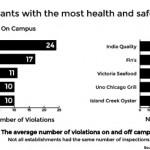
While a recent Gallup poll suggests business majors are less likely to receive mentorship from professors, several students studying business at Boston University agree that there is not a lack of support in BU’s School of Management programs.
Undergraduate business majors said they were less likely to receive support and guidance from professors compared to their peers studying in other areas such as arts, humanities, social sciences and technology, reported the survey, released Thursday.
Only 9 percent of all graduates surveyed agreed they had professors who mentored them, cared about them and inspired them during their undergraduate studies, landing them in last place among other majors in terms of emotional support, according to the report.
School of Management sophomore Lucas Lombardo said he does not see any shortage of mentorship in SMG’s business program.
“Resources are available to anyone looking for support,” Lombardo, who is studying finance, said. “They [students] just need to be proactive. Professors won’t know you’re looking for it unless you talk to them.”
About 30,000 people across the United States with a bachelor’s degree or higher were surveyed, according to the report. The data was based off the inaugural Gallup-Purdue Index, which examines the relationship between college experience and life after graduation.
While around half of business graduates surveyed admitted to having a professor who inspired them to learn, only 21 percent of graduates felt professors at their university cared about them, and just 14 percent said they had a professor who they considered a mentor that supported their goals and aspirations.
Maria Simeonova, a sophomore in SMG considering a concentration in marketing, said her professors are very accommodating and understanding.
“It’s not a stereotypical cut-throat, everyone-for-themselves situation,” she said. “A lot [of instances of emotional support] have been when I reach out to professors about grades and exams. They follow up with you. If you can’t make office hours, they’re open to scheduling other times because they know you have other things going on.”
Ji Hyun Kim, a senior in SMG studying international management, operations management and finance, said one of her professors helped her get a position as a teaching assistant.
“I meet with him regularly, and he gives me advice on things to do after graduation,” Kim said. “I can talk with him freely without having to worry about grades. It really depends on how much time you have to develop that [sort of] relationship.”
Norm Blanchard, director of the Undergraduate Program Office at SMG, said providing support for students is a priority.
“I am often encouraged by the positive feedback from our students regarding their experience in SMG, both in their interaction with their faculty and our advising staff,” he said in an email. “How SMG students’ experience compares with that of their fellow Terriers, I’m not sure, but I would suspect that we would come out reasonably favorably.”
Blanchard said in order to improve student services, UPO surveys students who come into the office monthly and surveys graduating students annually.
Several students said despite the exceptional support and resources offered by SMG faculty, they can still see how the Gallup poll’s findings are applicable at BU.
Joyjit Chakrabarti, a second year graduate student studying strategy and business analysis in SMG, said while emotional support is available, it is more difficult to form relationships with professors at the graduate level.
“Professors know these guys [graduate students] are experienced and have professional networks already in place,” he said. “For undergraduates, they [professors] are more eager to impart knowledge and let them [the student] know if they don’t know how the professional world works out there.”
Vice Chairman and archives keeper for The Daily Free Press Board of Directors. Former news editor. I like data, politics, and higher education, but will write about anything.




